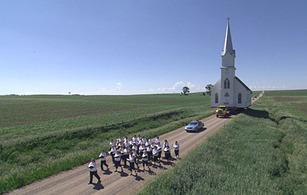 I meet monthly with a group of ministers to discuss the current state of The Church and possible paths forward. We guide our discussions by working our way through books that do much the same thing. I suppose our hope is that the people who write these books will have much more experience in helping churches gain new life than any one of us individually might have and thus give us much needed guidance in doing the same for the churches where we serve (and a magic blueprint would be nice too).
I meet monthly with a group of ministers to discuss the current state of The Church and possible paths forward. We guide our discussions by working our way through books that do much the same thing. I suppose our hope is that the people who write these books will have much more experience in helping churches gain new life than any one of us individually might have and thus give us much needed guidance in doing the same for the churches where we serve (and a magic blueprint would be nice too).
The most recent book talks about churches “reinventing” themselves to appeal to younger generations. Now mind you, it is not advocating for or against “reinventing” church, it is merely making commentary about churches doing so. Well, I have to say, I had to read that part of the book over and over again to try to make sense of it. Something just wasn’t setting well with me about “reinventing” church.
The book itself is about change and the part that mentions churches reinventing themselves is actually addressing the way change represents loss – loss of the past, loss of how things used to be done, loss of traditions. With that loss is, understandably, also the loss of things that helped define both personal and corporate identity. So, reinventing, changing, represents loss which threatens identity. I have no problem with that. Not only does it make sense, I’ve seen it happen time and time again in church when change is introduced.
It seems to me that the fact that we see change as “reinventing” is the problem. Our churches and our personal lives are supposed to be about journeying to\toward\and with God. When applied to churches within our modern context, talking about reinventing our churches, changing to appeal to younger generations, points to a previous lack of movement, a stagnation.
That’s the problem. At some point we, The Church, stopped moving and we allowed our identity to get wrapped up in the pursuit of the things of this world rather than in the pursuit of God. Change must be who we are – people in motion, moving toward God, toward Creation, toward the children of God. As Christians, when change threatens our identity, it doesn’t point to a problem with change, it points to a problem with our identity. God was constantly calling the people of God to go on journeys (think Noah, Moses, Abraham, David, Jonah) and Jesus asked everyone he met to change in some way. In every case, constant change. To be Christian is to be a people of change, the old life is gone the new life has begun.
Despite our best efforts, we never manage to be the people God calls us to be, but we must always try – and that means changing from what we once were to something closer to what God is calling us to be, reinventing ourselves every day, every hour, every minute to be a better reflection of God.
It is a problem that we think of changing as reinventing ourselves. If we hope to survive going forward, rather than reinventing ourselves, we have to reclaim our heritage as people constantly on a journey, embracing change at every turn…and we have be willing to do it every day, every hour, every minute. Rather than threatening our identity, change must be our identity as we constantly reinvent ourselves closer to the reflection of God we were created to be.











